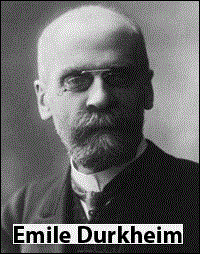Emile Durkheim – Biography

Emile Durkheim was born on 15th April 1858 in a Jewish Family at Epinal in France. He remained a brilliant student throughout his academic career. He graduated from the known college of Paris Ecole Normale and earned the degree of Philosophy in 1882. From 1882 to 1887, he served as a teacher of philosophy in several schools in Paris.
In 1887, he married Louise Dreyfus and had two children, Andre and Marie.
His primary goal was to establish sociology as an independent academic discipline. Initially, sociology was not a separate discipline but a part of history and economics. He argued that Sociology is not a part of any other science but is itself a distinct and independent science. Durkheim achieved his goal of establishing Sociology as an independent academic discipline when the University of Bordeaux awarded him the world’s first academic appointment as a lecturer in Sociology in 1887. He later on promoted to the rank of professor and was made the head of the department of social sciences in the same university. As a part of his official duties, he worked on reforming the French school system and included social sciences in its curriculum.
In 1893, he published his doctoral thesis with the title of ‘Division of Labor’ which describe the basis for social solidarity, integration and order in modern society. He was deeply concerned about the problem of modernizing French society such as moral degeneration. His theory of division of labor was an effort to reflect on the nature of social solidarity in different societies so that this information can be applied to strengthening the cohesive forces for the integration of modern society.
In 1895, Durkheim published ‘The Rules of Sociological Method’ to describe what is sociology and what methods should be adopted to generate sociological knowledge. As a part of his effort to establish sociology as an independent science, he emphasized the use of the scientific method in sociology to obtain scientific and valid sociological knowledge. His approach to study society was purely scientific. He was inspired by the positivistic approach of Auguste Comte. He argued that sociology is a science, and it should employ a scientific method for the acquisition of sociological knowledge.
In his Rules of Sociological Method, he also introduced a new term ‘Social Fact’. The purpose of introducing this term was to develop a common concept as a focus of all areas of sociology. According to Durkheim, social facts are factors or forces (external to the human body) which influence human beings to behave in certain ways. He defined sociology as a scientific study of social facts. He believed that exploring these external factors will help in understanding the social behaviour of human beings.
In 1897, Durkheim put forward his remarkable ‘Theory of Suicide’ to explain various types of suicide with special reference to their social causes. It is one of his influential works which contributed to the field of sociology. The theory of suicide is also viewed as the first scientific work in the realm of social sciences because it was the first study that was based on systematic procedures of inquiry.
In 1902, Durkheim chaired the department of education at Sorbonne University in Paris. After a long period of his efforts, from this position, he successfully included social sciences in the academic curriculum of Parisian institutions.
In 1906, he became the professor of Science of Education. In 1913, he started to chair the department of Education and Sociology. He had a great influence on his student and other teachers of sociology.
In 1912, Durkheim published his work with the title of ‘The Elementary Forms of the Religion Life’ which was his last written work. It was another great contribution to address the problems of the modernizing society such as moral degeneration and social disintegration.
His son, Andre, died in fighting combat in World War I in December 1915. This setback gave him an intense psychological trauma that impacted his life adversely.
At the age of 59, He died of a heart stroke on 15th November 1917 in Paris. He was buried at the Montparnasse Cemetery in Paris.
The major contributions of Emile Durkheim in the realm of Sociology are as follows:
- Division of Labour (Doctoral Thesis 1893)
- The Rules of Sociological Method (1895)
- The Theory of Social Facts (1895)
- Theory of Suicide (1897)
- The Elementary Forms of Religion (1912)




